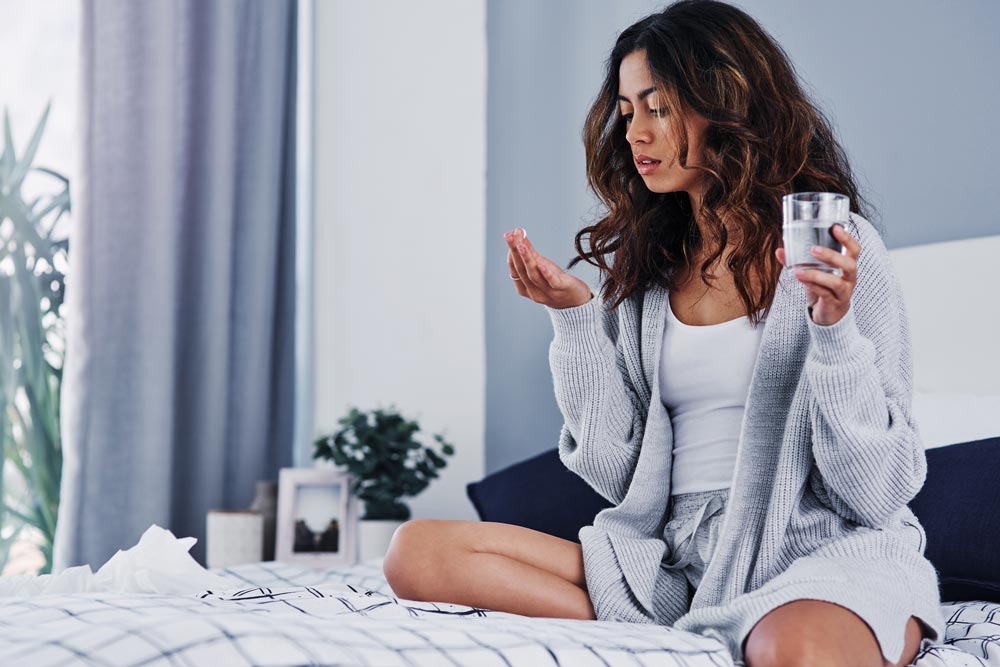
Depression is a common mental health condition, and many people find some relief from the symptoms of depression with the use of antidepressants. (1) According to data collected between 2015-2018, 13.2 percent of adults aged 18 and over reported that they used antidepressant medications in the preceding 30 days. (2)
While antidepressants can be very effective for improving symptoms of depression and anxiety, they may also affect your normal sleep rhythm (for better or for worse). Depression can also disrupt sleep. If you’ve been prescribed an antidepressant or are considering asking your healthcare provider for one, it’s helpful to understand the relationship between antidepressants and sleep.
Note: The content on Sleepopolis is meant to be informative in nature, but it shouldn’t be taken as medical advice, and it shouldn’t take the place of medical advice and supervision from a trained professional. If you feel you may be suffering from any sleep disorder or medical condition, please see your healthcare provider immediately.
Long Story Short
- Antidepressant medications are widely used to help relieve certain symptoms of depression, anxiety, and other mental health conditions.
- Using antidepressants comes with a risk of potential side effects, including changes in your sleep pattern, for better or for worse. Some types of antidepressants, like SSRIs and SNRIs, are more likely to keep you awake, while TCAs and atypical antidepressants may have more of a sedative effect.
- To promote better sleep when using antidepressants, experts recommend allowing your body time to adjust to the new medication, ensuring good sleep hygiene habits, and communicating with your healthcare provider.
The Relationship Between Antidepressants and Sleep
Like many medications, antidepressants come with their share of potential side effects, one of which is sleep disturbances. Almost all antidepressants suppress rapid eye movement (REM) sleep, which is a period of vivid dreaming and heightened brain activity similar to being awake. Over time, not getting much REM sleep can result in noticeable effects like trouble concentrating and remembering things, not being able to think creatively, fewer vivid dreams, and heightened stress. (3) These medications can also increase levels of brain chemicals that may influence your sleep regulation, like serotonin and norepinephrine. Serotonin helps regulate mood, appetite, and sleep, whereas norepinephrine helps regulate your stress response, arousal, and attention. (4)
Can Antidepressants Help You Sleep?
The types and risk of new sleep problems partially depend on the type of antidepressant you’re prescribed. If you came here wondering whether there are antidepressants that help sleep, the answer is a resounding… maybe. If improving your sleep is one of your biggest wants when considering antidepressants, there are certain ones that may be more beneficial, like Tricyclic antidepressants (TCAs).
Tricyclic antidepressants (TCAs) and certain atypical antidepressants have sedative effects and may actually be prescribed to help with sleep issues. TCAs like amitriptyline and doxepin often have strong antihistamine activity (think Benadryl-like effects), which can promote drowsiness and help people fall asleep. (5) Atypical antidepressants (named as such because they don’t fit into the other categories of antidepressants) such as mirtazapine and trazodone have sedative effects that may improve sleep quality by targeting different brain chemical systems. (6) (7)
However, Alison Tarlow, Psy.D., licensed clinical psychologist and certified addictions professional (CAP) at Boca Recovery Center cautions, “Some of the sedating antidepressants carry a risk of psychological dependence. For example, a person might develop the belief that sleep is impossible without the medication, even though the substance itself has no physical addiction potential.” (8)
What about other types of antidepressants? For instance, do SSRIs help with sleep? According to Dr. Bryan Bruno, medical director at Mid City TMS, a New York City-based medical center focused on treating depression, “SSRIs can occasionally cause sleep disturbances as an early side effect. The drugs increase the levels of serotonin, which can occasionally cause vivid dreams.” Serotonin is a neurotransmitter (brain chemical) involved in regulating things like your mood, anxiety, sleep, appetite, and digestion. (9)
What Is an SSRI?
An SSRI (Selective Serotonin Reuptake Inhibitor) is a type of antidepressant medication that works by increasing the level of serotonin, sometimes called a “feel good” chemical, in the brain. By preventing the reabsorption (reuptake) of serotonin into neurons, SSRIs help boost mood and reduce symptoms of depression and anxiety. (9)
Furthermore, Tarlow says the effects of antidepressants on sleep are complex and can also depend on dosage and timing. For example, she says, “Sedating antidepressants will promote good sleep when taken at night, while taking a stimulating antidepressant in the morning can reduce the risk of the side effect of insomnia.” Tarlow adds that aligning the effects of your antidepressants with your sleep pattern requires “a nuanced management that avoids the pitfalls of dependency.”
Do Antidepressants Cause Insomnia?
Of all the antidepressant types, SSRIs like fluoxetine (Prozac), sertraline (Zoloft), escitalopram (Lexapro), and serotonin-norepinephrine reuptake inhibitors (SNRIs) like venlafaxine (Effexor), duloxetine (Cymbalta), and desvenlafaxine (Pristiq) are more likely to be associated with sleep disturbances. (9) (10)
The main reason these types of antidepressants may promote insomnia is because they increase levels of serotonin and norepinephrine in your brain, which can interfere with sleep regulation and cause increased alertness. (9)
Plus, they can affect your sleep architecture, reducing the duration of deep sleep and REM sleep, leading to fragmented and less restorative sleep. “Sleep architecture” refers to the sequence and pattern of the different sleep stages your body enters through the night, including non-rapid eye movement (NREM) sleep stages 1, 2, and 3 as well as REM sleep. Each stage of sleep serves specific functions related to physical and mental restoration, memory consolidation, and overall well-being. (11)
Tarlow says it’s important to allow your body time to get used to a new medication. “While some individuals may manifest some sleep disturbances immediately after being placed on a new antidepressant, such effects improve once the body adjusts to the medication.”
Antidepressant Withdrawal and Sleep
Regardless of the type of antidepressant you’ve been prescribed and what it’s being used to treat, it’s important to follow your provider’s guidance on how (and when) to adjust your dosage or stop taking it altogether. Coming off of antidepressants too suddenly can lead to a slew of side effects, like anxiety, sweating, confusion, vertigo, and insomnia. (12) Withdrawal usually happens when someone quits their medication suddenly after taking it for longer than four to six weeks.
Doctors will usually recommend patients wean off their medications by reducing doses in increments over weeks at a time. For example, someone may go from taking 10 mg of their medication every day for two weeks, then to taking 5 mg of it every day for two weeks, then to taking 5 mg every other day for two weeks — before stopping altogether. (13) (14)
Bruno notes, “If you taper off gradually, under your doctor’s supervision, it usually helps to minimize withdrawal symptoms, including sleep disturbances. Gradually reducing the dosage allows your body time for adjustment and thus makes it easier to maintain good sleep patterns.”
He emphasizes that stopping antidepressants “cold turkey” tends to bring more withdrawal symptoms such as insomnia and night sweats that are largely preventable with a slower, more intentional tapering period.
Overall, never adjust medication without consulting your doctor. One of their jobs is to help you come up with a reasonable, safe plan for how to get off of your medication (when it’s appropriate to do so) with the least amount of side effects possible.
Tips for Sleeping Better While Taking Antidepressants
If you’re experiencing sleep disruptions on antidepressants or are concerned that starting one will negatively affect your rest, there are things that can help set you up for the best sleep possible.
First, make sure that you’re taking an antidepressant designed for your specific mental health needs. There are many categories of antidepressants that may or may not be recommended for certain symptoms. Communicate in detail what you’re experiencing with your provider so they can ensure you’re on the most appropriate prescription.
Next, it’s important to be patient. Starting any new medication can come with hiccups during the adjustment period — it can take several weeks to a couple of months for users to feel the full effects of antidepressants. If you notice any significant negative changes to your sleep or otherwise that don’t go away after a few weeks, reach out to your provider. They may instruct you on adjusting your dosage or considering another medication altogether. (15)
Finally, practicing sleep hygiene is important (even if you’re not taking antidepressants). Sleep hygiene refers to behavioral habits and environmental factors that help set us up for a good night of rest, which starts several hours before we go to bed. (16)
For example, Bruno says, “I recommend to my patients that they go to bed and wake up regularly at the same time every day, including on weekends and holidays.” He adds, “Exercising regularly can do wonders, but try to avoid any rigorous routines before bedtime. Journaling to deal with stress and eating healthy foods can also be beneficial in helping to get better sleep.”
Another way to enhance your sleep hygiene is to create a sleep-promoting environment. This might include breathable pajamas, a comfortable mattress and sheet set, calming colors, blackout curtains, and/or a noise machine to help you relax. (17)
FAQs
Do all antidepressants cause insomnia?
Not all antidepressants cause insomnia; the effect varies depending on the specific medication and individual response. While SSRIs and SNRIs are often associated with sleep disturbances, some antidepressants, like tricyclic antidepressants and certain atypical antidepressants, can have sedative effects and may help with sleep issues. (9) (10)
Can you take antidepressants and sleeping pills?
Taking antidepressants and sleeping pills together may be possible but should only be done under the supervision of a healthcare provider to avoid interactions and side effects. (18)
What can I take to help me sleep on antidepressants?
To help with sleep while on antidepressants, a doctor may prescribe other medications with sedative properties, including trazodone or mirtazapine. (19) Additionally, over-the-counter options like melatonin or lifestyle changes such as maintaining a regular sleep schedule and practicing good sleep hygiene might be recommended. Of course, it’s always important to let your healthcare provider know if you’re planning on introducing any over-the-counter medications into your routine, especially if you’re taking antidepressants. (16)
The Last Word From Sleepopolis
Sleep is one of the most important aspects of maintaining our physical, emotional, and mental health. While antidepressants can be very effective in addressing certain symptoms of depression and anxiety, it’s possible that they can disrupt your normal sleeping patterns. To marry antidepressants and sleep as harmoniously as possible, keep good sleep hygiene practices in mind, use your medication as directed, and communicate concerns with your provider.
Sources
- Goodwin RD, Dierker LC, Wu M, Galea S, Hoven CW, Weinberger AH. Trends in U.S. Depression Prevalence From 2015 to 2020: The Widening Treatment Gap. Am J Prev Med. 2022;63(5):726-733. doi:10.1016/j.amepre.2022.05.014
- Centers for Disease Control and Prevention. (2020) Antidepressant Use Among Adults: United States, 2015-2018. Retrieved from: https://www.cdc.gov/nchs/products/databriefs/db377.htm
- Crișan CA, Milhem Z, Stretea R, Țața IM, Cherecheș RM, Micluția IV. A Narrative Review on REM Sleep Deprivation: A Promising Non-Pharmaceutical Alternative for Treating Endogenous Depression. J Pers Med. 2023;13(2):306. Published 2023 Feb 10. doi:10.3390/jpm13020306
- Riemann D, Krone LB, Wulff K, Nissen C. Sleep, insomnia, and depression. Neuropsychopharmacology. 2020;45(1):74-89. doi:10.1038/s41386-019-0411-y
- Moraczewski J, Awosika AO, Aedma KK. Tricyclic Antidepressants. [Updated 2023 Aug 17]. In: StatPearls [Internet]. Treasure Island (FL): StatPearls Publishing; 2024 Jan-. Available from: https://www.ncbi.nlm.nih.gov/books/NBK557791/
- Jilani TN, Gibbons JR, Faizy RM, Saadabadi A. Mirtazapine. In: StatPearls. Treasure Island (FL): StatPearls Publishing; August 28, 2023.
- Wichniak A, Wierzbicka AE, Jarema M. Treatment of insomnia – effect of trazodone and hypnotics on sleep. Leczenie bezsenności – wpływ trazodonu i leków nasennych na sen. Psychiatr Pol. 2021;55(4):743-755. doi:10.12740/PP/125650
- Everitt H, Baldwin DS, Stuart B, et al. Antidepressants for insomnia in adults. Cochrane Database Syst Rev. 2018;5(5):CD010753. Published 2018 May 14. doi:10.1002/14651858.CD010753.pub2
- Edinoff AN, Akuly HA, Hanna TA, et al. Selective Serotonin Reuptake Inhibitors and Adverse Effects: A Narrative Review. Neurol Int. 2021;13(3):387-401. Published 2021 Aug 5. doi:10.3390/neurolint13030038
- Shelton RC. Serotonin and Norepinephrine Reuptake Inhibitors. Handb Exp Pharmacol. 2019;250:145-180. doi:10.1007/164_2018_164
- Hutka P, Krivosova M, Muchova Z, et al. Association of Sleep Architecture and Physiology with Depressive Disorder and Antidepressants Treatment. Int J Mol Sci. 2021;22(3):1333. Published 2021 Jan 29. doi:10.3390/ijms22031333
- Hengartner MP, Davies J, Read J. Antidepressant withdrawal – the tide is finally turning. Epidemiol Psychiatr Sci. 2019;29:e52. Published 2019 Aug 22. doi:10.1017/S2045796019000465
- Harvard Health Publishing. (2022). How to taper off your antidepressant. Retrieved from: https://www.health.harvard.edu/diseases-and-conditions/how-to-taper-off-your-antidepressant
- Sørensen A, Juhl Jørgensen K, Munkholm K. Clinical practice guideline recommendations on tapering and discontinuing antidepressants for depression: a systematic review. Ther Adv Psychopharmacol. 2022;12:20451253211067656. Published 2022 Feb 11. doi:10.1177/20451253211067656
- Harmer CJ, Goodwin GM, Cowen PJ. Why do antidepressants take so long to work? A cognitive neuropsychological model of antidepressant drug action. British Journal of Psychiatry. 2009;195(2):102-108. doi:10.1192/bjp.bp.108.051193
- Alanazi EM, Alanazi AMM, Albuhairy AH, Alanazi AAA. Sleep Hygiene Practices and Its Impact on Mental Health and Functional Performance Among Adults in Tabuk City: A Cross-Sectional Study. Cureus. 2023;15(3):e36221. Published 2023 Mar 16. doi:10.7759/cureus.36221
- Troynikov O, Watson CG, Nawaz N. Sleep environments and sleep physiology: A review. J Therm Biol. 2018;78:192-203. doi:10.1016/j.jtherbio.2018.09.012
- Brain and Behavior Research Foundation. (2020). Adding Ambien to an SSRI Antidepressant Could Help Some Depressed Patients with Severe Insomnia. Retrieved from: https://bbrfoundation.org/content/adding-ambien-ssri-antidepressant-could-help-some-depressed-patients-severe-insomnia
- Henssler J, Alexander D, Schwarzer G, Bschor T, Baethge C. Combining Antidepressants vs Antidepressant Monotherapy for Treatment of Patients With Acute Depression: A Systematic Review and Meta-analysis. JAMA Psychiatry. 2022;79(4):300-312. doi:10.1001/jamapsychiatry.2021.4313
Tarlow, Alison. Personal interview. July 15, 2024.
Bruno, Bryan. Personal interview. July 15, 2024.




























